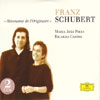Schubert Piano Works
Iridescent playing from Pires in a strong and seductive partnership
View record and artist detailsRecord and Artist Details
Composer or Director: Franz Schubert
Genre:
Instrumental
Label: Deutsche Grammophon
Magazine Review Date: 5/2005
Media Format: CD or Download
Media Runtime: 0
Mastering:
Stereo
Catalogue Number: 477 5233GH2

Tracks:
| Composition | Artist Credit |
|---|---|
| Fantasie |
Franz Schubert, Composer
Franz Schubert, Composer Maria João Pires, Piano Ricardo Castro, Piano |
| Rondo |
Franz Schubert, Composer
Franz Schubert, Composer Maria João Pires, Piano Ricardo Castro, Piano |
| Sonata for Piano No. 13 |
Franz Schubert, Composer
Franz Schubert, Composer Maria João Pires, Piano |
| Sonata for Piano No. 14 |
Franz Schubert, Composer
Franz Schubert, Composer Ricardo Castro, Piano |
| Allegro, 'Lebensstürme' |
Franz Schubert, Composer
Franz Schubert, Composer Maria João Pires, Piano Ricardo Castro, Piano |
Author: Harriet Smith
Here is a typically imaginative programme from Maria João Pires, sharing the limelight with Ricardo Castro (who briefly made headlines when he won the 1993 LeedsCompetition). They take one solo sonata each but it is for the duets that this release is of greatest interest. Whereas the solo sonatas have found their rightful place in the canon, a pall of doubt still hangs over the duets in general, with the exception of the F minor Fantasie and the Grand Duo. While it’s true that some of the myriad dances and marches smack of the production line, there are other pieces that deserve serious attention. Pires and Castro select two of the finest – the Rondo in A (which Pires previously recorded with Hüseyin Sermet, together with the Fantasie) and A minor Allegro.
The Allegro is an extraordinary piece, setting out its large-scale intentions from the beginning. It was a key that provoked some of Schubert’s bleakest utterances and this piece is no exception. Chords are beautifully weighted here and the major theme (from 1’45”) is as consolatory as the rare major interludes in Winterreise. The Rondo is as warm as the Allegro was desolate, with none of the bass-heaviness that you find in less polished duet performances. In the F minor Fantasie Pires and Castro are profoundly moving, treading a middle ground between the extrovert Eschenbach and Frantz and the poetic Lupu and Perahia.
In the Sonata No 14 competition is tough: Brendel, Uchida, Kempff and Pires herself, who offered plenty of drama and character in a 1989 DG recording. Castro can seem a touch fey by comparison, though his dreamier finale is very tender. Uchida remains my top choice, from the whispered bare octaves of the opening to the orchestral vehemence of the finale. Pires offers a delightfully intimate reading of the A major Sonata, one that has you metaphorically drawing your chair closer, in contrast to the more public style of Kempff. She has a remarkable knack of producing a sound that is iridescent yet never lightweight.
The recording is gorgeously warm, with a realistic sense of perspective. Ideally, more index points would have been useful – 18-minute tracks are cumbersome – but there’s only one serious blot on the landscape: the booklet. Here’s a taster: ‘A primary sensitivity which would be doomed to the fatal lacerations of intensity in all its implacability, were it not entirely surrounded, enfolded, so that it registers any “impact” only as filtered, sifted.’ Quite so. Should you want any details on the music or players, then you’ll have to look elsewhere. For optimum pleasure, chuck the booklet and relish the discs.
The Allegro is an extraordinary piece, setting out its large-scale intentions from the beginning. It was a key that provoked some of Schubert’s bleakest utterances and this piece is no exception. Chords are beautifully weighted here and the major theme (from 1’45”) is as consolatory as the rare major interludes in Winterreise. The Rondo is as warm as the Allegro was desolate, with none of the bass-heaviness that you find in less polished duet performances. In the F minor Fantasie Pires and Castro are profoundly moving, treading a middle ground between the extrovert Eschenbach and Frantz and the poetic Lupu and Perahia.
In the Sonata No 14 competition is tough: Brendel, Uchida, Kempff and Pires herself, who offered plenty of drama and character in a 1989 DG recording. Castro can seem a touch fey by comparison, though his dreamier finale is very tender. Uchida remains my top choice, from the whispered bare octaves of the opening to the orchestral vehemence of the finale. Pires offers a delightfully intimate reading of the A major Sonata, one that has you metaphorically drawing your chair closer, in contrast to the more public style of Kempff. She has a remarkable knack of producing a sound that is iridescent yet never lightweight.
The recording is gorgeously warm, with a realistic sense of perspective. Ideally, more index points would have been useful – 18-minute tracks are cumbersome – but there’s only one serious blot on the landscape: the booklet. Here’s a taster: ‘A primary sensitivity which would be doomed to the fatal lacerations of intensity in all its implacability, were it not entirely surrounded, enfolded, so that it registers any “impact” only as filtered, sifted.’ Quite so. Should you want any details on the music or players, then you’ll have to look elsewhere. For optimum pleasure, chuck the booklet and relish the discs.
Discover the world's largest classical music catalogue with Presto Music.

Gramophone Digital Club
- Digital Edition
- Digital Archive
- Reviews Database
- Full website access
From £8.75 / month
Subscribe
Gramophone Full Club
- Print Edition
- Digital Edition
- Digital Archive
- Reviews Database
- Full website access
From £11.00 / month
Subscribe
If you are a library, university or other organisation that would be interested in an institutional subscription to Gramophone please click here for further information.




